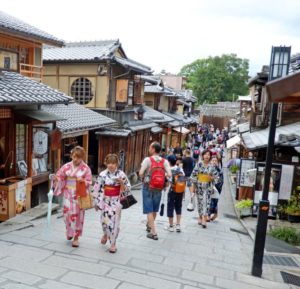
KANSAI is well established as the cultural center and the historical heart of Japan, but I think the Southern- central region has much more to show off than its vivid past.
Osaka, the second largest metropolitan area in the country, is a must-go for Potterheads who dream to chug on a butterbeer at Three Broomstick with a scenic view of Black Lake and Hogwarts.
Kyoto transports us back to an epoch where geishas and ninjas walked the streets, aside from showcasing a creatively interesting modern interpretation of the famous Japanese noodle soup dish.
Osaka: Of food and magic
Have you had a box of Pocky? How about a bite of the fluffy smooth, melt-in-your mouth Pablo cheesecake?
Or the famous ball-shaped snack called Takoyaki?
You may not realize it but, yes, you’ve already been introduced to Osaka.
But when you finally get the chance to visit Osaka, Dotonbori is a good place to start.
Since the Doton Canal’s completion in the 1600s, Dotonbori has been a major place for commerce, trade and entertainment.
It still serves the same purpose today but much more focused on food culture.
Dotonbori is teeming with stalls, shacks and restaurant sselling street food, ramen and other specialty dishes—Osaka ramen, takoyaki, kushikatsu, pufferfish, desserts and many others.
Dotonbori is truly a gastronomic utopia. So how does one spot the best restaurants?
Pay attention to the long waiting lines.
Are you ready for a magical adventure?
Spending a full day at Universal Studios Japan is a must when in Osaka.
And what excites me the most every visit is … cue the “Harry Potter” theme song “The Wizarding World of Harry Potter” … the nearest Hogwarts to visit for Potterheads in the Philippines.
Get your wands ready and learn the proper way of swishing and flicking to get the magic spells right.
Ready?
Locomotor!
Assuming you passed the wand lessons, celebrate with a feast at Three Broomstick with a mug of cold, or hot, butterbeer.
Then head to Hogwarts for “The Harry Potter and The Forbidden Journey” attraction.
Be sure you let the food settle down a bit though because the ride can be a bit extreme.
And before going back to the muggle world, bring back some magical goodies with you. A can of ‘Butterbeer drops’ and a box of ‘Every Flavour Beans,’ perhaps?
Tour around Kyoto’s historic sites
Just 45 minutes by train from Osaka is Kyoto City.
Known in Japanese history as the former Imperial capital of Japan for more than a thousand years, tourists flock this part of the Kansai region for its well-preserved temples and areas reminiscent of Japan’s rich culture and history.
Modern and resembling a mall, Kyoto Station is not telling you much what you are about to encounter when you visit traditional temples in its area.
Before going around, be sure to get a Kyoto day pass. For only 600Yen, it sure would save you a lot (and I mean A LOT) of money on bus fare.
It’s available in Tourist Information counters in Kyoto Station, and in many convenient stores in Kyoto.
Explore different sites for two days.
First head to the stunning Kinkakuji —a Zen Buddhist temple that houses one of the most famous structures in the region—Kinkaku or The Golden Pavilion.
The building’s top two stories are covered in pure gold leaves which when hit by sunlight gives a majestic gleam.
Then you may hop on a bus and make your way to Kiyomizudera.
It’s considered to be one of the most impressive temples in Kyoto and is famous for its wooden stage where you can get a scenic view of the lush maple and cherry blossom trees.
Founded in 780, its name was coined from Otowa Waterfall which is situated in the very complex.
Pretty close Kiyomizudera are Yasaka Shrine and a “Starbucks from the past.”
You may walk from Kiyomizudera to these two spots.
On my second day in Kyoto, I went to the far west side, at Arashiyama Bamboo Grove.
I smiled in amusement as I walked along this bamboo trail as it reminded me of scenes from one of my favorite anime “Samurai X” where the protagonist Kenshin Himura fights off thieves and bad guys.
You should keep in mind that Arashiyama is a bit far from Kyoto’s center, and to maximize your time here, I highly recommend for you to visit nearby
temples and attractions like the Zen temple of Tenryu-ji, Okochi-sanso Villa, Nison-in Temple and Gio-ji temple.
Then hop on a bus to Fushimi Inari Taisha, a temple that sits at the base of Inari mountain.
Inari is the god of rice and worshipped as the patron of business.
The temple is distinctively famous for its bright orange torii path that leads up to the peak of Inari mountain.
Midway to the summit is a viewing ledge where you get a glimpse of Kyoto’s urban district.
I allotted two days to roam around Kyoto’s historical sites during my recent trip and every night in this historic city was spent around Gion, on the lookout for geishas and specialty ramen.